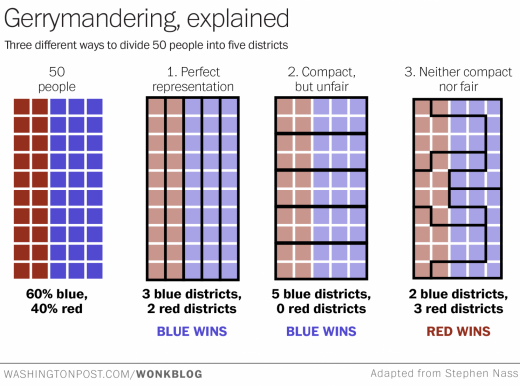
Real VOTER Fraud is Gerrymandering.
America's voting process is rigged.
Republicans and Democrats rig elections by Gerrymandering. Why is this legal? Why don't we outlaw it? Our politicians are inherently unethical if they do not outlaw Gerrymandering. Our politicians are unethical, cynical, and hypocritical.
"Is it possible to create fairly drawn voting districts in states?"
https://www.quora.com/Is-it-possible-to-create-fairly-drawn-voting-districts-in-states
18 Answers
Joseph Hendrix, software engineer always looking for opportunities
Joseph Hendrix, #votethirdparty
Answered Apr 10, 2017
"Not really. Gerrymandering is the proverbial genie in a bottle, or Pandora’s box. Once we figured out gerrymandering, it’s hard not to do. There’s things you can do to make it more difficult, but you can’t really get rid of it.
The Washington Post had an article awhile back with an image explaining gerrymandering:
This image seems to imply that the second column “1. Perfect representation” is not gerrymandering, and that somehow the third column is somehow less fair (but maybe not gerrymandering?) and that the fourth column is somehow gerrymandering.
Here’s the thing: all four of these, including the one without the winner label, could be considered gerrymandering.
Why?
Let’s say you’re in charge of making the districts, and you want blue to win. You have a pretty good idea of how people are going to vote. Which representation would you choose? Probably not number 3 (the fourth column). Any of the other three columns will work to make sure blue wins.
Of course, if you wanted red to win, you would choose number 3 (again, the fourth column. I really don’t like the way this chart is numbered…)
It doesn’t matter that the majority of votes are for blue without districting.
It matters whoever does the districting wants to win.
How can we makes districting “fair?”
The first step is to make gerrymandering harder. We do that by requiring constraints. The above example does that to a degree - there are a distinct number of districts (5), each district has to be contiguous, and each district has to have the same number of constituents (voters). Without these constraints, gerrymandering would be ridiculously easy (in the above example, you could easy split the red votes into multiple districts and have the blue votes be one district, giving red districts many votes to blue’s one).
In practice, this isn’t as easy as the above example. Fifty voters go into five districts quite easily, and each voter is a presumable a single household. What would happen in a blue voter and a red voter lived in the same house? Can you divide 52,682 voters into five districts? Ten districts? How about 14?
You also don’t really now how people are going to vote. Back in Elbridge Gerry’s time, and up to maybe the 1950’s, you did have a pretty good idea of what / who people were going to vote, especially since voter intimidation was easier. But today, people move around a lot. So one district that decidedly vote Democrat today may vote Republican ten years from now simply because the people changed. People today are less inclined to vote a straight ticket than they used to.
I think a more complex voting system - such as ranked voting - instead of the current first-past-the-post voting system would help combat gerrymandering, but only in the sense it would make gerrymandering more difficult, not impossible."
Study this. America's "democracy" will be rigged as long as we do not eliminate true voter fraud, Gerrymandering.
"Gerrymandering in the United States"
https://en.wikipedia.org/wiki/Gerrymandering_in_the_United_States
"Gerrymandering in the United States has been practiced since the founding of the country to strengthen the power of particular political interests within legislative bodies."
"Throughout the 20th century, courts have grappled with the legality of these types of gerrymandering and have devised different standards for the different types of gerrymandering. Various legal and political remedies have emerged to prevent gerrymandering, including court-ordered redistricting plans, redistricting commissions, and alternative voting systems that do not depend on drawing boundaries for single-member electoral districts."
"Is Partisan Gerrymandering Legal? Why the Courts Are Divided."
By MICHAEL WINESJAN. 11, 2018
https://www.nytimes.com/2018/01/11/us/gerrymander-court-north-carolina-pennsylvania.html
"Only a decade ago, partisan gerrymandering appeared all but a dead legal issue. This week’s rulings underscore its return to center stage in the debate over the health of democracy — and how rapidly demands to rein it in have grown."
"Is Partisan Gerrymandering Unconstitutional?"
A quick look at the Supreme Court’s divided record on redistricting for political gain.
by Lois Beckett Nov. 7, 2011
https://www.propublica.org/article/is-partisan-gerrymandering-unconstitutional
"In a recent interview, former Supreme Court Justice John Paul Stevens called Maryland's current redistricting plan, which draws districts to benefit the state's Democrats, "outrageously unconstitutional."
And that's not just because the Democratic plan divides a district with a majority of minority voters into several mostly white districts, an element of the plan that may face a legal challenge under the Voting Rights Act. It's because, in Stevens' judgment, drawing district lines to benefit one party violates the right of citizens to equal protection under the law.
"The government cannot gerrymander for the purpose of helping the majority party; the government should be redistricting for the purpose of creating appropriate legislative districts," Stevens said in a SCOTUSblog interview."
"This is actually what America would look like without gerrymandering"
By Christopher Ingraham By Christopher Ingraham Wonkblog January 13, 2016
"In his State of the Union speech, President Obama called on lawmakers and the public to take a number of steps "to change the system to reflect our better selves" for "a better politics." The top item on that list was to end partisan gerrymandering: "we have to end the practice of drawing our congressional districts so that politicians can pick their voters, and not the other way around," Obama said."
